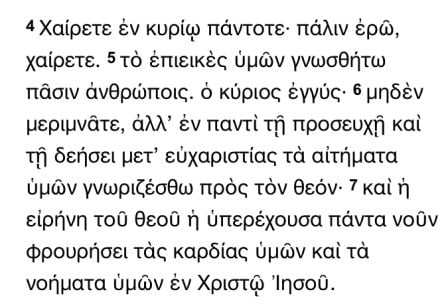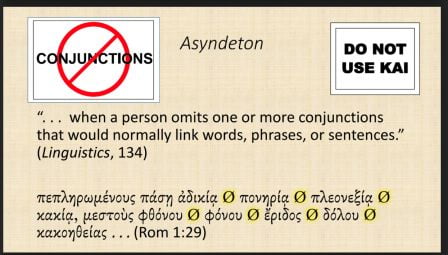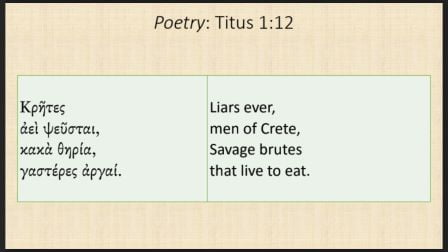Sunday, February 21, 2021
7:22 AM I love teaching. I just do. When I began my teaching career in 1976, I made it a top priority to mediate the findings of New Testament scholarship in a simple and untechnical fashion. This remains true today. In our next session in NT 2, I am eager to lead the class in a discussion of how Paul uses rhetorical devices to increase the hitting and drawing — the impact and appeal — of his message. One thing he delights in doing is using poetry and songs.
Another thing he does is to make certain words or phrases begin alike and end alike.
He does this to indicate unity and transition of thought in a document in which there was no capitalization, indentation, punctuation, or even spaces between words. One of these passages is the one we’re focusing on in NT 2 as we study the book of Romans — the “Cathedral of Christianity.” Here’s the assignment due that day:
Read Romans in its entirety. Romans 12-15 contains a host of valuable exhortations for everyday Christian conduct. What does Rom. 12:9-21 in particular have to say about the Christian way of life?
This is what it means to live life “in Christ.” It is a life whose primary principle is selfless love which is the fulfilling of the Law. This is the way the “renewed” Christian walks, with the hope of glory at the journey’s end.
Read and meditate on Paul’s words today. They are truly amazing:
When you show love people, don’t just pretend to love them. Your love must be completely sincere.
You should abhor what is evil.
You should hold on tightly to what is good.
Since you all belong to the same family, you should love one another affectionately.
You should take delight in honoring one another above yourselves.
You should never be lazy but always work hard.
You should be passionate about everything you do.
You should serve the Lord obediently.
When you realize how confident your hope in God is, you should be joyful.
When you experience trouble, you should endure it patiently.
When you pray, you should always expect God to answer you.
When God’s people are in need, you should always be ready to help them.
When strangers need a place to stay overnight, you should welcome them into your home.
When people persecute you and cause you to suffer, ask God to bless them. Yes, ask God to bless them. Don’t ask him to make something bad happen to them.
When people are joyful, you ought to be joyful with them.
When people are weeping, you ought to weep with them.
You should always live in harmony with one another.
You should never think you’re more important than other people. Instead, you should be willing to associate with ordinary people. Stop thinking you’re smarter than others.
When someone does something evil to you, you should not try to pay them back with more evil.
You should always be careful to do what is right in the eyes of everyone.
You should do everything possible on your part to live peaceably with everybody.
My dearest friends, when people mistreat you, you should never take revenge. Instead, leave that to the righteous anger of God. For the Scripture says, “I will take revenge. I will pay them back.” This is what the Lord says.
Instead, “If your enemies are hungry, give them something to eat. If they’re thirsty, give them something to drink. By acting toward them in this surprising way, you will make them burn with shame and maybe even help them change their attitudes and actions.”
Don’t be overcome by evil. Instead, overcome evil by doing good.
(From Dave Black Online. Used by permission.)


















